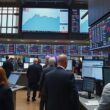Experts are increasingly advocating for an accelerated approach to Germany’s energy transition, responding to a recent monitoring initiative launched by Economics Minister Katherina Reiche.
Claudia Kemfert, an energy economist at the German Institute for Economic Research (DIW), stated that the current pace of the “Energiewende” is not too fast, but rather “too slow”. She acknowledges the usefulness of a monitoring process, but cautions against its potential misuse as a delaying tactic for crucial measures. Kemfert argues that any postponement will exacerbate the costs of the climate crisis, negatively impact German economic competitiveness and forgo opportunities for value creation and technological leadership.
Bernd Weber, founder and Managing Director of the EPICO Klima-Innovation think tank, echoed this sentiment, emphasizing that the core issue isn’t speed, but a “lack of efficiency” in the expansion of renewable energy sources. He posits that slower-than-expected growth in electricity demand necessitates accelerating structural reforms, not slowing down the transition.
Weber highlights that an increased supply of renewable energy is essential to meet growing demand and stabilize electricity prices and that hindering expansion also stifles investment in key sectors like industry, building and transportation.
Experts are calling for a “pivot point” to efficiently connect supply and demand. Storage solutions and flexible consumption patterns, if incentivized with appropriate pricing signals, could play a crucial role in reducing costs.
Andreas Löschel, an environmental economist and lead author of the energy chapter in the forthcoming IPCC report, underscores the need for a multifaceted approach – more renewables, upgraded grids, increased flexibility, controllable power plants and digitalization. However, he notes that the anticipated pace of electrification has not materialized as quickly as planned. Löschel emphasizes the importance of adaptability, both downwards and upwards and suggests that even with lower demand, the ambitious 80% renewable energy target by 2030 remains feasible.





